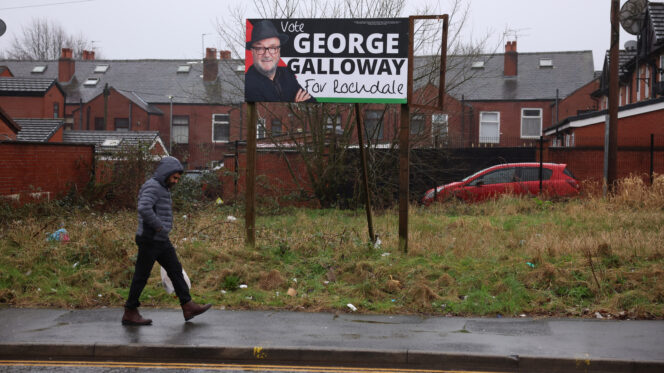Northern Leaders Don’t Just Want Funding – They Want Real Power
Gratitude and righteousness don’t easily sit side by side.
by Craig Gent
5 March 2024

Northern metro mayors have vowed to “stand up for all Northerners” following a conference last Friday at which levelling-up secretary Michael Gove announced increased devolved settlements for West Yorkshire, South Yorkshire and the Liverpool City Region.
In a joint statement at this year’s Convention of the North in Leeds, the leaders of five combined authorities vowed to “buck the trend of vested interests and a Whitehall-knows-best approach” with a forthcoming “manifesto for the North” that intends to establish a deeper working relationship between northern England’s devolved regions, opening a new front in Britain’s national politics.
Despite these words, the question remains: how do devolved English regions secure greater powers at a time when many local authorities are being pushed towards bankruptcy and central government has divested from northern transport plans?
This year’s Convention – the fifth of its kind – promised to signal a revolution in northern politics, which has long lacked a united political expression.
90% of northerners are set to have a directly-elected mayor by 2025. Inaugural mayoral elections in the York and North Yorkshire combined authority and the North East mayoral combined authority are taking place in May. Meanwhile, Hull and East Yorkshire could have an elected mayor from next year, according to government plans.
Directly-elected mayors Tracy Brabin (West Yorkshire), Jamie Driscoll (North of Tyne), Andy Burnham (Greater Manchester), Steve Rotheram (Liverpool City Region) and Oliver Coppard (South Yorkshire) say they “will no longer accept the status quo of pitching areas of deprivation against one another”.
Speaking to hundreds of delegates from across northern politics, business and education, Gove unveiled plans to upgrade the West Yorkshire, South Yorkshire and the Liverpool City Region devolution deals to “level four”, expanding some powers around skills, transport and local energy planning.
Gove says he hopes to strike a similar deal with Conservative Tees Valley mayor Ben Houchen, who did not participate in the conference. Houchen has been under enormous scrutiny recently over the governance of the Teesworks freeport project.
But responses to the move, which is being billed as a “stepping stone” to greater devolution, demonstrate the tightrope being walked by northern leaders when negotiating with the government. They all talk about wanting to end “cap-in-hand” politics, but doff the cap to Whitehall when they need to.
Liverpool City Region mayor Steve Rotheram said: “The granting of new powers shows that the Liverpool City Region is among the country’s leading and most successful areas in delivering on the promise of devolution.”
But he also said: “We believe that those new powers we have secured still only scratch the surface of what areas like ours could achieve with true devolution.”
He wants a “trailblazer” deal, the status currently enjoyed by Greater Manchester and the West Midlands, which would see combined authorities awarded a “single settlement” from the Treasury, allowing mayors greater autonomy over regional spending. As it stands, regions that are being upgraded to a level four deal will still have to assemble bids for government money.
Rotheram believes that Gove has undergone a “road to Damascus” conversion – embracing English devolution fully.
But a change in attitudes sits uneasily alongside the realities playing out closer to home.
Local authority finances are in crisis. According to the New Statesman, local authorities in Bradford, Middlesbrough, St Helens, Cheshire East and Stoke-on-Trent may have to follow Nottingham in filing for effective bankruptcy. Meanwhile, Warrington and Chorley are both believed to have high levels of debt for their size, according to credit ratings agency Moody’s.
At the same time, public transport across the north is a mess. Ire over the cancellation of the second northern leg of HS2 remains palpable, Sheffield’s buses are so bad they have sparked protests, and despite reassurances over the £2.5bn set to be put into a mass transit system for West Yorkshire, similar plans have been announced and then cancelled twice over the last 30 years.
At its best, greater cooperation between the north of England’s mayors shows the potential of this front in British politics. Despite the limitations on their power and variations between deals, the positions promise political legitimacy for the regions they represent and a conduit to the Treasury.
More interesting still are initiatives such as the “manifesto of the North” – expected to be released in summer – which demonstrates that even Labour northern mayors are not exactly in lock-step with their political party in Westminster.
Addressing the Convention, deputy prime minister and shadow levelling-up secretary Angela Rayner promised to be a “deputy prime minister for the North”, channelling John Prescott, but declined to offer anything of substance beyond familiar overtures to her own northern credentials and references to well-touted ideas such as Labour’s “take back control bill”, unveiled by Keir Starmer in January 2023.
Instead, it is the present alliance of mayors in the north who appear to be demonstrating leadership on the future of the levelling up project, with some – including Burnham, Rotheram and now-independent Driscoll – setting a high bar for expectations of a future Labour government by pointing to examples such as Germany’s federal constitution.
Optimists will celebrate the potential for re-establishing a municipal politics outside of Westminster; sceptics will question whether any mayor can truly break from Whitehall’s reins. But there appears to be a critical mass building, and, certainly, none of the mayors have an appetite for sliding back on the devolution project.
Craig Gent is Novara Media’s north of England editor and the author of Cyberboss (2024, Verso Books).


